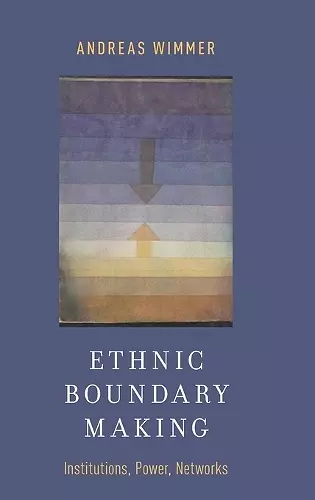Ethnic Boundary Making
Institutions, Power, Networks
Format:Hardback
Publisher:Oxford University Press Inc
Published:7th Feb '13
Currently unavailable, and unfortunately no date known when it will be back
This hardback is available in another edition too:
- Paperback£37.99(9780199927395)

Andreas Wimmer's Ethnic Boundary Making offers a fresh perspective on the role of ethnicity in society, revealing its complex influence on inequality and identity.
In Ethnic Boundary Making, Andreas Wimmer explores the complexities of ethnicity and its implications in various societal contexts. He delves into how ethnicity, race, and nationality are often intertwined with disparities in education, income, and health. By applying a boundary-making perspective, Wimmer seeks to unravel the intricate relationship between discrimination, preferences for certain groups, and the functioning of labor markets and educational institutions. He questions how familial ties and shared educational backgrounds influence these dynamics, providing a nuanced understanding of ethnicity's role in society.
Wimmer introduces a comparative theory of ethnicity that sheds light on why ethnicity holds significance in some societies while remaining less relevant in others. He examines the conditions under which ethnic and racial differences lead to inequality and exclusion, contrasting these with situations where such differences are less impactful. This exploration is grounded in the idea that institutional incentives, power dynamics, and existing social networks shape the importance of ethnicity in various contexts.
The book presents a comprehensive overview of ethnic configurations globally, outlines Wimmer's new theoretical framework, and suggests innovative research designs that focus on non-ethnic units of observation. Through qualitative studies, network analyses, and statistical evaluations, Wimmer illustrates the practical applications of his boundary-making approach, using examples such as immigrant ethnicity in Switzerland and the racial dynamics among U.S. college students on social media platforms.
"Ethnic Boundary Making has the makings of a classic. The author takes on a vast and important topic, provides a bold and ambitious theoretical agenda, and engages in theory development by convincingly confronting his hypotheses with data of various kinds. As he goes along, Wimmer explains the implications of his findings for a wide range of theories and debates in sociology and beyond, engaging with the best and the brightest in the multi-disciplinary literatures on ethno-racial divisions, immigration and citizenship, and group formation. This ambitious book will surely leave its mark and be widely debated." -Michele Lamont, author of The Dignity of Working Men: Morality and the Boundaries of Race, Class, and Immigration "Ethnic Boundary Making summarizes a vast research program on the topic. Wimmer problematizes what others have taken for granted by showing that ethnicity is neither pre-determined and immutable, nor entirely constructed and malleable. In the end, ethnic boundaries reflect the interaction between the power of privileged groups seeking to legitimize their position and those of subordinate ones to alter, though various strategies, their own. Wimmer's vast erudition and command of empirical materials worldwide makes the book both a valuable reference point and worth arguing with." -Alejandro Portes, Howard Harrison and Gabrielle Snyder Beck Professor of Sociology, Princeton University "This is one of the most exciting books I have read in any social science in two decades. It offers a root-and-branch revamping of the constructivist paradigm in the study of ethnic division, infusing a field marred by national myopia and cultural parochialism, rampant moralism and stale political posturing with conceptual rigor, empirical vigor, historical depth and geographic breadth. Mating theoretical insights from Barth, Moerman and Bourdieu, Wimmer elaborates a lucid 'comparative analytic of how and why ethnicity matters.' He demonstrates its merits by taking us on a dazzling world tour of salient cases, past and present, and he rolls out sophisticated research designs suited to disentangling ethnic from other dynamics of social structuration. Ethnic Boundary Making marks a signal advance in the study of inequality, identity, and group formation, and it will cement Wimmer's place at the forefront of analytic sociology." -Loïc Wacquant, author of Urban Outcasts "The sweeping theoretical ambition of Ethnic Boundary Making is innovative and exciting; Wimmer's analytic framework enables the systematized accumulation of knowledge about ethnic boundary processes from the most diverse contexts, promising genuine theoretical advancement of this field." -American Journal of Sociology
ISBN: 9780199927371
Dimensions: 163mm x 239mm x 25mm
Weight: 649g
304 pages